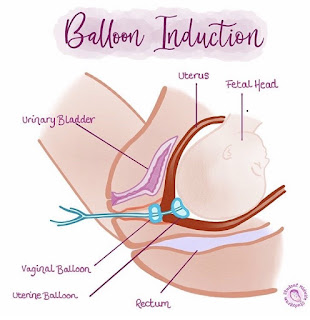Informed choice - Can I Decline an Induction?
Hi lovelies. How are we? I haven't written a blog post for a couple of weeks as in all honesty, I was enjoying my annual leave too much!!! However, other than drinking gin & eating everything I shouldn't (did anyone else do home workouts for a whole two weeks and then sack it off?) I actually noticed on several Facebook groups that a lot of women are really against being induced. I think this stems from a lot of scary stories that women love to tell their friends, about how horrendous being induced is, how you were refused an epidural & your midwife screamed at you to hold your breath and push. Really, I think as women we love to dramatise our stories. I know I do!! One glass of wine & a small inconvenience turns into 'have I told you the worst moment of my life happened yesterday?'.
Inductions are usually suggested because there is a risk factor that we worry about. One example is a big baby. There can be different reasons your baby is on the bigger side, but the most common cause is gestational diabetes due to the higher blood sugar levels & your baby producing more insulin in response to this. With bigger babies, we worry that they may get stuck when they deliver (a shoulder dystocia is the official term) and birth trauma to both you and baby. Therefore, we try to produce a plan that can counteract these risks, which more often than not involves an induction.
For some women, their induction really was traumatising for them & some even have PTSD from their labour & birth. But for others, they find their induction actually okay & had a good midwife who supported them through it. The thing is, there isn't one labour or birth that is exactly the same which makes it very difficult to really compare them to another woman's experience. Also, the method of induction differs between trusts but the aim is always the same - to soften & dilate the cervix enough to break your waters & get you into labour. I'm not going to explain each method of induction because it's a discussion you need to have with your community midwife, so that is definitely applicable to you & trust specific.
However, every hospital does use that dreaded method - the hormone drip, otherwise known as syntocinon/pitocin. I say this is the dreaded method because I have read countless horror stories about it on forums & every woman I induce is terrified of it. I really think the more you know, the less you fear. So, here are 3 syntocinon facts -
- The syntocinon drip is started at a very low rate & increased every half an hour until you are contracting 4-5 times in 10 minutes. As it is forcing your body to contract rather than having a slow latent phase & building up to active labour the contractions can be more painful than if they were to come on naturally. Really consider the pain relief you are open to & do not feel bad if the epidural you were so against is now what you want. There are no brownie points for bravery here!
- The drip can cause fetal distress, but that is why we run it through a pump so that it can be altered - reduced/stopped if they're distressed & increased to increase contractions. We also use continuous fetal monitoring & analyse babies heart rate every hour with another colleague to ensure the trace is still normal & baby is coping well - this is called 'fresh eyes' & aims to reduce errors by having a fresh person look at the trace.
- Many of you will be aware that an induced labour can lead to a higher risk of an instrumental delivery. In 2004-2005, 15% of women had an instrumental delivery (NICE, 2008). It's believed that this is because having an induction often leads to an epidural, which effects the sensation of pushing causing it to be less effective. You can read the guideline here.
Nobody can force you to accept an induction as its your body, your baby, your choice. Every decision about interventions in your labour should be informed. Ask your midwife & obstetrician the advantages & risks of each intervention. Healthcare professionals are here to work with you as a team & you can make a plan of care based around your wishes. For example, if you want to decline an induction for being overdue, you can instead attend the hospital for daily monitoring on a CTG, which analyses babies heart rate & movements at that point in time (being aware of your babies movements is really important, as reduced fetal movements are a big indicator that your baby could be distressed. You should always call your assessment unit if you are worried about them). You could even make a plan to have regular stretch & sweeps (if your waters haven't gone as that would be a big infection risk) to try to induce labour that way instead. These plans need to be made with somebody higher up than a midwife (we may be fabulous but not that fabulous) such as an obstetric doctor or consultant. As long as you know the evidence-based risks of declining the recommendations & have a plan with alternatives that you are happy with, declining an induction is absolutely your choice.
Another thing about induction, is that it has many steps. You may have your waters broken and then contract like a steam train & not need the hormone drip! You just never know. If this is the case, you can still have that lovely water birth you dreamt about for the last nine months! In any induction, the best thing to do is stay mobile, stay upright, eat, stay hydrated & communicate with your midwife. Ask for the wireless monitoring so that you can still move around! Use your tea lights, massage & aromatherapy. You can still absolutely have the lights dimmed & hypnobirth as you would with a spontaneous labour.
Ps. - Apologies to anyone who comes across a caregiver who is unwilling to compromise - you should 100% always be able to make your own choice. Anyone who says otherwise is wrong & will hopefully miss out on the last biscuit in the staff room.
Han Xx



Comments
Post a Comment
Any thoughts on this post? Let me know!